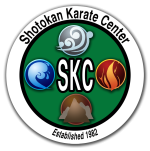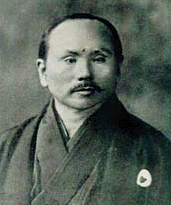道場訓 – Dojo Kun
Hitoh-tz! Jin-kaku kan-say-ni tsuto-mulu kotoh.
Seek perfection of character
(To strive for the perfection of character)
Hitoh-tz! Makoto-noh michi-oh mamolu kotoh.
Be faithful
(To protect/defend the paths of truth)
Hitoh-tz! Dolyoku-noh say-shin-oh yashi-na-u kotoh
Endeavour
(To foster the spirit of effort)
Hitoh-tz! Lay-gih-oh omong-zulu kotoh
Respect others
(To honor the principles of etiquette)
Hitoh-tz! Kekki-noh you-oh ima-shimulu kotoh
Refrain from violent behavior
(To guard against impetuous courage)
_________________________________________________________________________
Master Funakoshi’s Twenty Precepts of Karate-Do
1.Karate begins with courtesy and ends with courtesy.
2. There is no first attack in karate.
3. Karate is an aid to justice.
4. First control yourself before attempting to control others.
5. Spirit first, technique second.
6. Always be ready to release your mind.
7. Accidents arise from negligence.
8. Do not think that karate training is only in the dojo.
9. It will take your entire life to learn karate; there is no limit.
10. Put your everyday living into karate and you will find myo (subtle secrets).
11. Karate is like boiling water. If you do not heat it constantly, it will cool.
12. Do not think that you have to win, think rather that you do not have to lose.
13. Victory depends on your ability to distinguish vulnerable points from invulnerable ones.
14. The battle is according to how you move guarded and unguarded (move according to your opponent).
15. Think of your hands and feet as swords.
16. When you leave home, think that you have numerous opponents waiting for you. It is your behavior that invites trouble from them.
17. Beginners must master low stance and posture, natural body positions are for the advanced.
18. Practicing kata is one thing, engaging in a real fight is another.
19. Do not forget to correctly apply: strength and weakness of power, stretching and contraction of body, and slowness and speed of techniques.
20. Always think and devise ways to live the precepts every day.
_________________________________________________________________________
1868-1957
Master Gichin Funakoshi (d. 1957), the founder of Shotokan karate, was born in Okinawa in 1868. Master Funakoshi’s introduction to the world of karate came about through his primary school classmate who was the son of the great master Yasutsune Azato. Master Funakoshi began training at a time when the government forbade the practice of karate and training was therefore conducted in great secrecy. In these years Master Funakoshi trained tirelessly under Master Azato and Master Yasutsune Itosu. These great masters are also responsible for the cultivation of the founders of Goju-ryu and Shito-ryu, Master Chojun Miyagi and Master Kenwa Mabuni.
Master Funakoshi is responsible for changing the character used to write the word karate. Initially, the characters used for kara meant “Chinese,” but Master Funakoshi, amid some protest, changed this first character to one meaning “empty,” resulting in the meaning “empty hand.” In 1902, a program to introduce karate into the public school system was initiated in the Okinawa Prefecture and this is recorded by Master Funakoshi as the first introduction of karate to the general public. In 1917, Master Funakoshi travelled to Kyoto, Japan as the representative of the Okinawa Prefecture for the first demonstration of karate, outside of Okinawa. In 1922, Master Funakoshi was invited to Tokyo for the First National Athletic Exhibition of the Ministry of Education. Due to the high demand for his teaching and knowledge, Master Funakoshi remained in Japan, travelling, teaching, and conducting demonstrations. Among these demonstrations was one that took place in 1928, on palace grounds, at the behest of the Imperial Household Agency. In his writings, Master Funakoshi reflects on the progression of karate from its conduct in extreme secrecy to its widespread acceptance and celebration, in amazement. Master Funakoshi’s role in this introduction and dissemination of karate is why he is known, worldwide, as the “father of modern karate.” Although Master Funakoshi was not fond of labels for different styles of karate, his students began to call his style of karate Shotokan, in honor of Master Funakoshi, whose penname was Shoto, meaning “pine waves.” Around 1935, the first official karate dojo was constructed in Japan and in 1936, Master Funakoshi saw the name Shotokan, for the first time, written on the dojo’s sign. It was with the completion of the new dojo that Master Funakoshi formalized the dan and kyu system (official grading/ranking systems). Three books written by Master Funakoshi, among many other writings, are critical to the preservation of knowledge and recording the history of karate for all generations to come: Karate-do My Way of Life, Karate-do Kyohan, Karate-do Nyumon. The accomplishments of Master Funakoshi, listed above, were a gift to all who practice karate today. Master Funakoshi proved that the human body is capable of amazing feats, that there are many unknown capabilities that simply require discovery and unleashing. Master Funakoshi taught us, through his own life and experience, that there are no limits to who can practice karate, a sickly child, someone with a very small frame, and the elderly. Karate, as demonstrated by Master Funakoshi, has no retirement age. Additionally, Master Funakoshi was a great advocate of the participation of women in karate training, at a time in which this was not openly promoted and supported by society. In addition to recounting Master Funakoshi’s accomplishments in these regards, it is of critical importance, especially today, to recall the thing upon which Master Funakoshi placed the greatest value. For this we turn to Master Funakoshi’s own words:
“The ultimate aim of karate lies not in victory nor defeat, but in the perfection of the character of its participants.”

